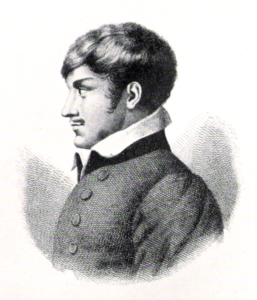To my heart
(Poet's title: An mein Herz)
Set by Schubert:
D 860
[December 1825]
O Herz, sei endlich stille,
Was schlägst du so unruhvoll?
Es ist ja des Himmels Wille,
Dass ich sie lassen soll.
Und gab auch dein junges Leben
Dir nichts als Wahn und Pein;
Hat’s ihr nur Freude gegeben,
So mag’s verloren sein.
Und wenn sie auch nie dein Lieben
Und nie dein Leiden verstand,
So bist du doch treu geblieben,
Und Gott hat’s droben erkannt.
Wir wollen es mutig ertragen,
So lang nur die Träne noch rinnt,
Und träumen von schöneren Tagen,
Die lange vorüber sind.
Und siehst du die Blüten erscheinen,
Und singen die Vögel umher,
So magst du wohl heimlich weinen,
Doch klagen sollst du nicht mehr.
Gehn doch die ewigen Sterne
Dort oben mit goldenem Licht
Und lächeln so freundlich von ferne,
Und denken doch unser nicht.
Oh heart, be quiet at last!
Why are you beating so restlessly?
It must be the will of heaven
That I should leave her!
And even though your young life gave
You nothing but delusion and pain,
It has only given her joy,
So let her be lost!
And even if she never understood either your love
Or your suffering,
You nevertheless remained faithful,
And God has acknowledged this above.
We want to bear it with courage,
So long as the tears are still flowing,
And dream of more beautiful days
Which are long past.
And if you see the blossoms appearing,
And if the birds sing around you,
You can still weep in secret
But you should no longer lament.
Despite everything the eternal stars are moving
Up there with their golden light,
And they smile down from afar in such a friendly way,
Yet they are not thinking about us.
All translations into English that appear on this website, unless otherwise stated, are by Malcolm Wren. You are free to use them on condition that you acknowledge Malcolm Wren as the translator and schubertsong.uk as the source. Unless otherwise stated, the comments and essays that appear after the texts and translations are by Malcolm Wren and are © Copyright.
☙
Themes and images in this text:
Birds Courage Detours and delusions Eternity Flowers Gold Hearts Joy Laments, elegies and mourning Near and far Pain Stars Tears and crying
In Schulze’s ‘Poetisches Tagebuch’ (Poetic Diary), ‘An mein Herz‘ is dated 23rd January 1816. Although he gives the impression in the poem that he is going to let go of his ‘beloved’ (Adelheid Tychsen), later poems written in the same month show that he simply could not stop obsessing about her. Nevertheless, ‘An mein Herz‘ is remarkable in that it is one of Schulze’s few texts where he shows some self-awareness and admits that what he has been experiencing is as much delusion as love.
The final stanza explains the sort of distancing that he believes that he wants to achieve. The stars continue to move and shine in such a friendly way that we are convinced that they reflect our own passions and hopes, yet another part of us also knows that they are totally unconnected with human beings and they do not care about us. There is a similar contradiction (or is it just a tension?) in the penultimate stanza: when spring comes, and blossom and bird song remind him of love, he tells himself that he should not lament, whilst allowing himself the indulgence of weeping in private.
He appears to know himself well enough to realise that he will always need to weep in some way. A poem which sets out to accept the end of his relationship with ‘courage’ is also in some ways a means of allowing him to continue indulging his passion. He does not really want his beating heart to rest. It is the only sort of heart he knows.
☙
Original Spelling An mein Herz O Herz, sey endlich stille! Was schlägst du so unruhvoll? Es ist ja des Himmels Wille, Daß ich sie lassen soll! Und gab auch dein junges Leben Dir nichts als Wahn und Pein; Hat's ihr nur Freude gegeben, So mag's verloren seyn! Und wenn sie auch nie dein Lieben Und nie dein Leiden verstand, So bist du doch treu geblieben, Und Gott hat's droben erkannt. Wir wollen es muthig ertragen, So lang nur die Thräne noch rinnt, Und träumen von schöneren Tagen, Die lange vorüber sind. Und siehst du die Blüthen erscheinen, Und singen die Vögel umher, So magst du wohl heimlich weinen, Doch klagen sollst du nicht mehr. Gehn doch die ewigen Sterne Dort oben mit goldenem Licht Und lächeln so freundlich von ferne, Und denken doch unser nicht.
Confirmed by Peter Rastl with Schubert’s source, Ernst Schulze’s sämmtliche poetische Schriften. Dritter Band. I. Poetisches Tagebuch. […] Leipzig: F. A. Brockhaus. 1819, pages 121-122; and with Sämmtliche poetische Werke von Ernst Schulze. Neue Ausgabe mit sechszehn Kupfern. Dritter Theil. Leipzig: F. A. Brockhaus. 1822, pages 123-124.
To see an early edition of the text, go to page 121 [137 von 336] here: http://digital.onb.ac.at/OnbViewer/viewer.faces?doc=ABO_%2BZ170542803


